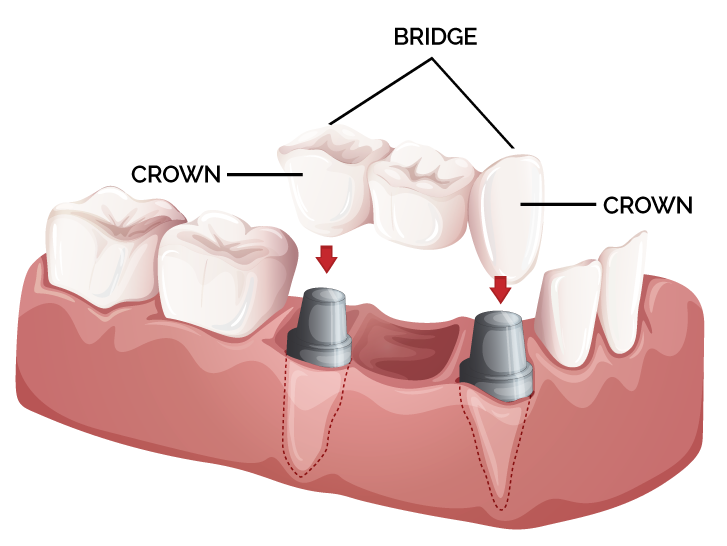
Dental crowns are also known as caps, are specific restorations that are more compatible for natural teeth that have sustained significant structure loss. They are also used for dental implants, replacing the missing teeth on top of the implant itself. They have a metal body custom and they are covered by a thin tooth-coloured porcelain layer to match the colour of the other teeth, blending in with the rest of your smile. The metal body fits the over whole tooth so it can withstand the biting pressure. In the frontal region for better aesthetic results, an all porcelain crown can be used. All porcelain crowns or Zirconia crowns are far more aesthetic and biocompatible with the gum tissue. There are many types of crowns that are available to the patients, but for sure their dentist will present each alternative depending on individual situations.
Bridges are also known as fixed partial dentures and they are used to replace multiple missing teeth. There are many materials they can be made of such as alloys, porcelain, gold or a combination. Dentists first prepare the surrounding teeth for crowns and anchor the bridges onto the surrounding teeth after the preparation procedure. When a dental practitioner decides that everything is okay he would cement the bridge into the prepared teeth. It is very important to know that only a trained dental professional is able to remove the fixed bridge.
The advantages of having a dental crown or bridge are:
- Great aesthetics. By using these dental tools, dentists will not only fill the space of missing teeth but they can change the colour as well as the shape of missed teeth.
- They are not removable. A crown or a bridge is a fixed construction and patient shouldn’t take it out and clean it like the partial dentures.
- If patients teeth are very damaged and broken, by placing crowns and bridges they can be protected and at the same time strengthen.
- Long lasting. These dental works are very durable, predictable and can last for a long period of time. But, patients have to keep in mind that once their teeth are prepared for this dental work there is no turning back.
- Less invasive treatment than dental implants. For those who want to have dental implants, their treatment may require more surgeries if they want to place a bone graft or more implants in the jaw.
The main disadvantages of having a dental crown or a bridge:
- This procedure can damage the enamel layer if the tooth is natural. But if the tooth is already damaged these dental works can act as a protection from further damage.
- Depending on which material is used for crown it can be a very expensive treatment. But if a patient needs bridgework then the price will escalate dramatically.
- Difficulty in the cleaning process. If patients wants their new treatment to last a long time, they have to maintain a good oral health care.
